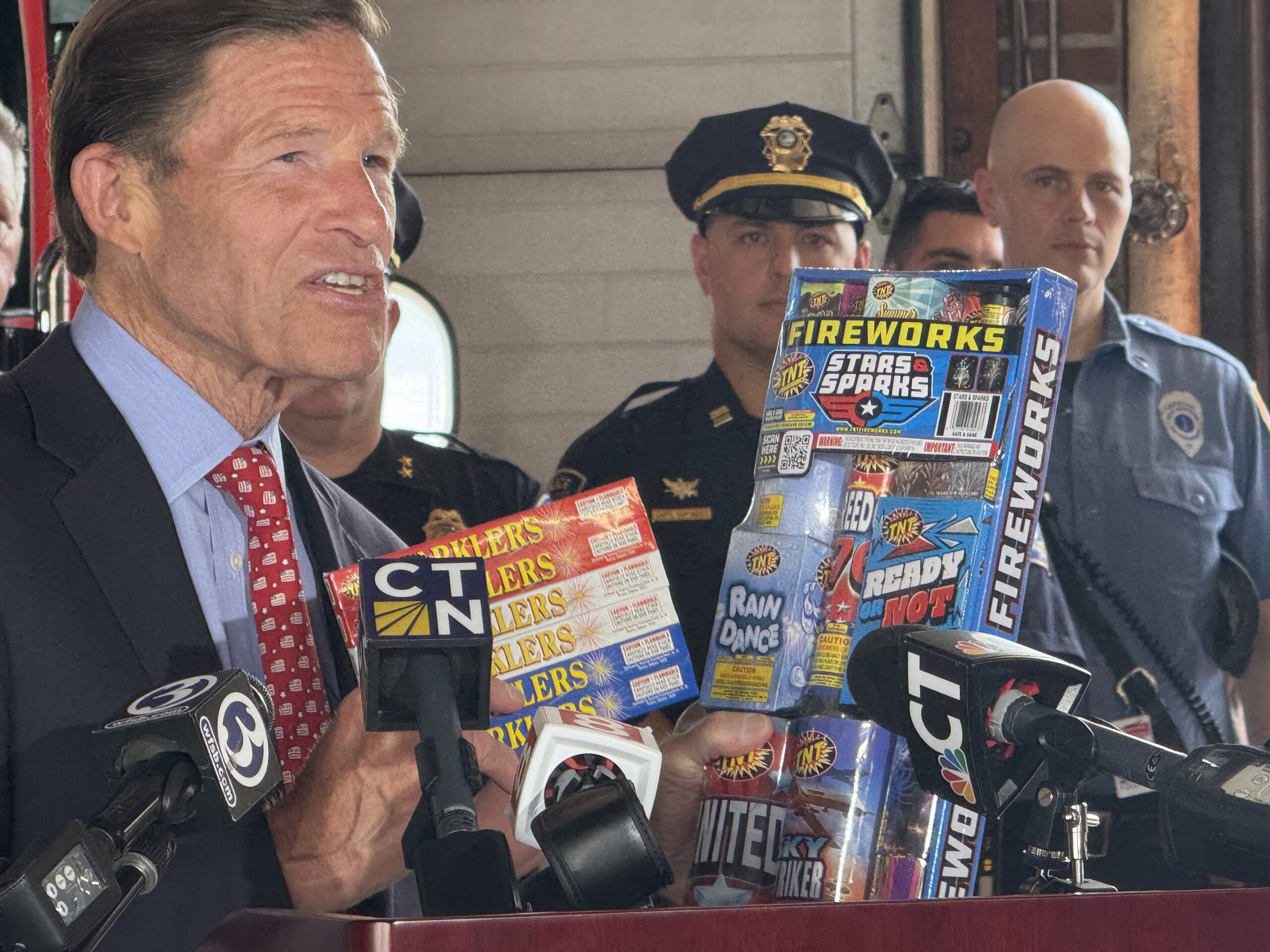Attorney General and Other Officials Urge Residents to Participate in National Drug Take Back Day

Audio By Carbonatix
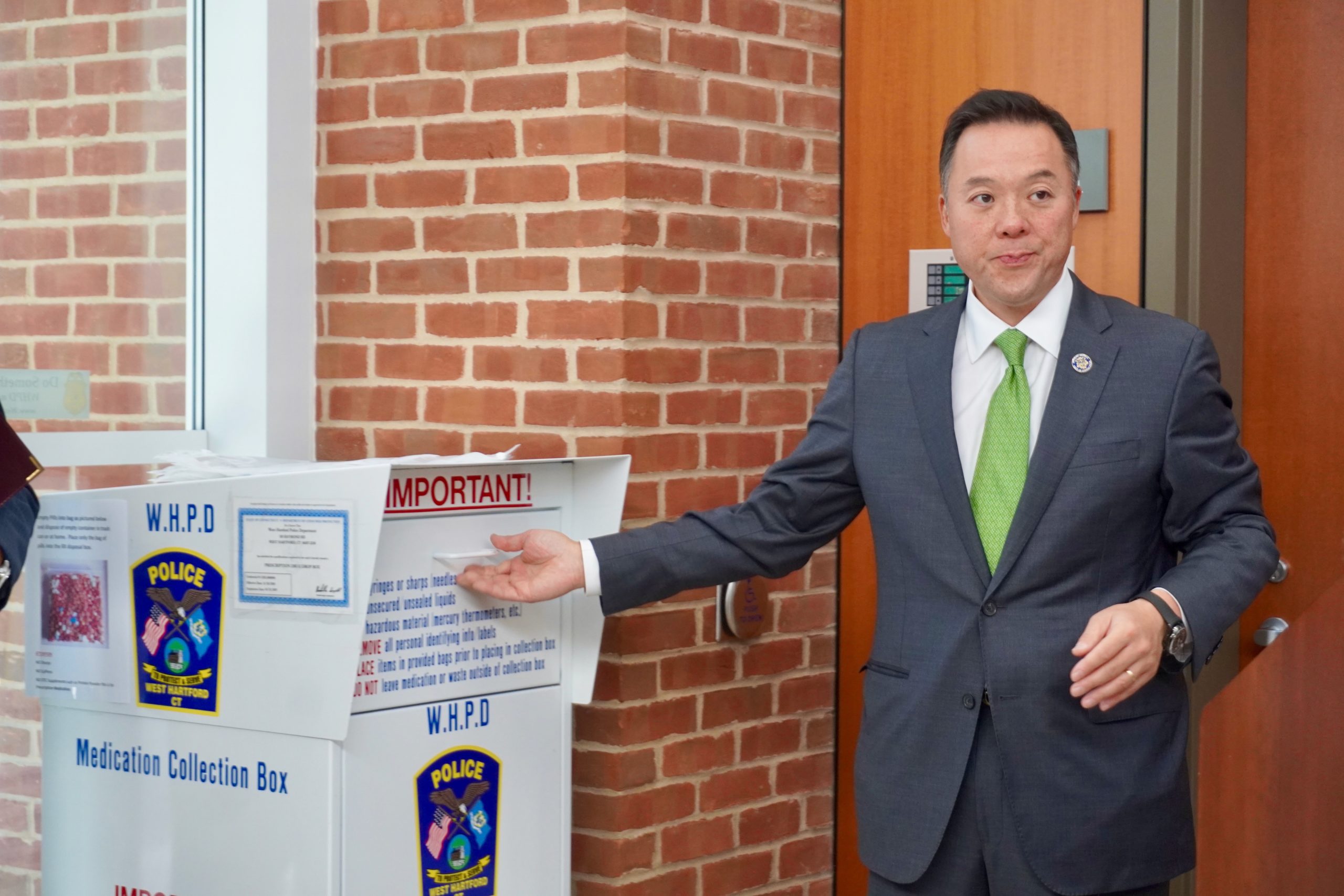
Connecticut Attorney General William Tong demonstrates the use of a drug collection box at the West Hartford Police Station. Photo credit: Ronni Newton
At a press conference at the West Hartford Police Department, Connecticut’s attorney general, officials from the departments of Consumer Protection and Mental Health and Addiction Services, a representative of the DEA, and West Hartford’s mayor urged participation in National Take Back Day on Saturday, Oct. 28, 2023.
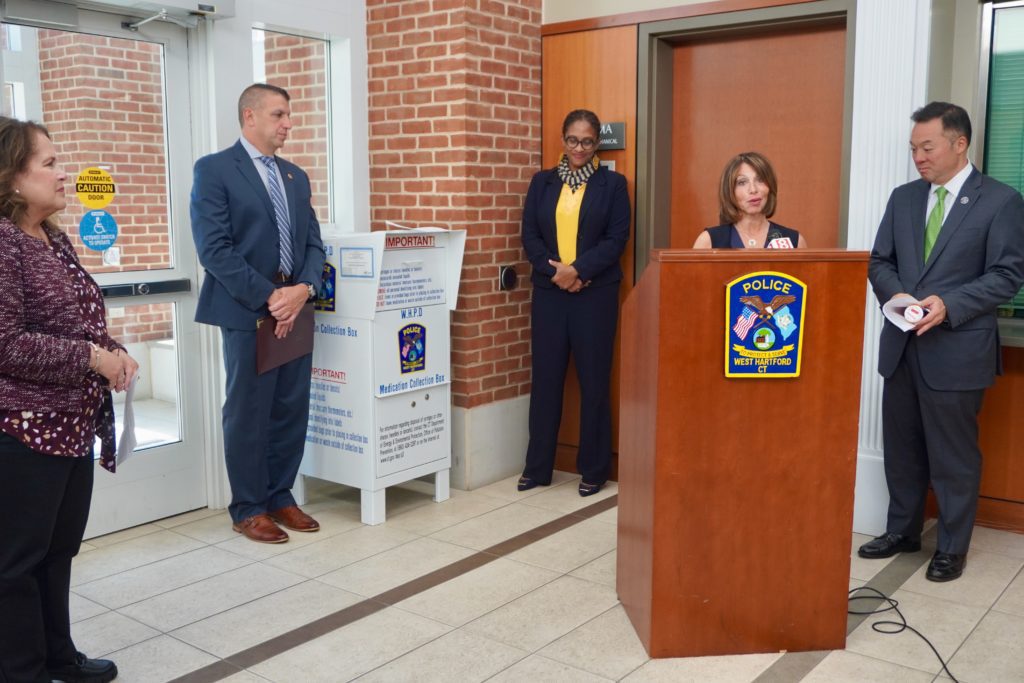
Mayor Shari Cantor speaks at a press conference about National Prescription Drug Take Back Day at the West Hartford Police Station. From left are DMHAS Commissioner Nancy Navarretta, DEA Special Agent David Lanzoni, DCP Deputy Commissioner Shirley Skyers-Thomas, Cantor, and Attorney General William Tong. Photo credit: Ronni Newton
By Ronni Newton
Removing unneeded medications from homes is one the best and simplest ways to help combat the enormous opioid addiction problem in this country, and Attorney General William Tong was at the West Hartford Police Department Thursday to urge Connecticut residents to rid their homes of unwanted or expired prescription medications by participating in Saturday’s National Prescription Drug Take Back Day or by using an official medication disposal boxes.
“On Saturday, as a country, we are observing National Prescription Drug Take Back Day,” Tong said. Nationwide there will be more than 5,000 collection sites, and many across Connecticut including in West Hartford.
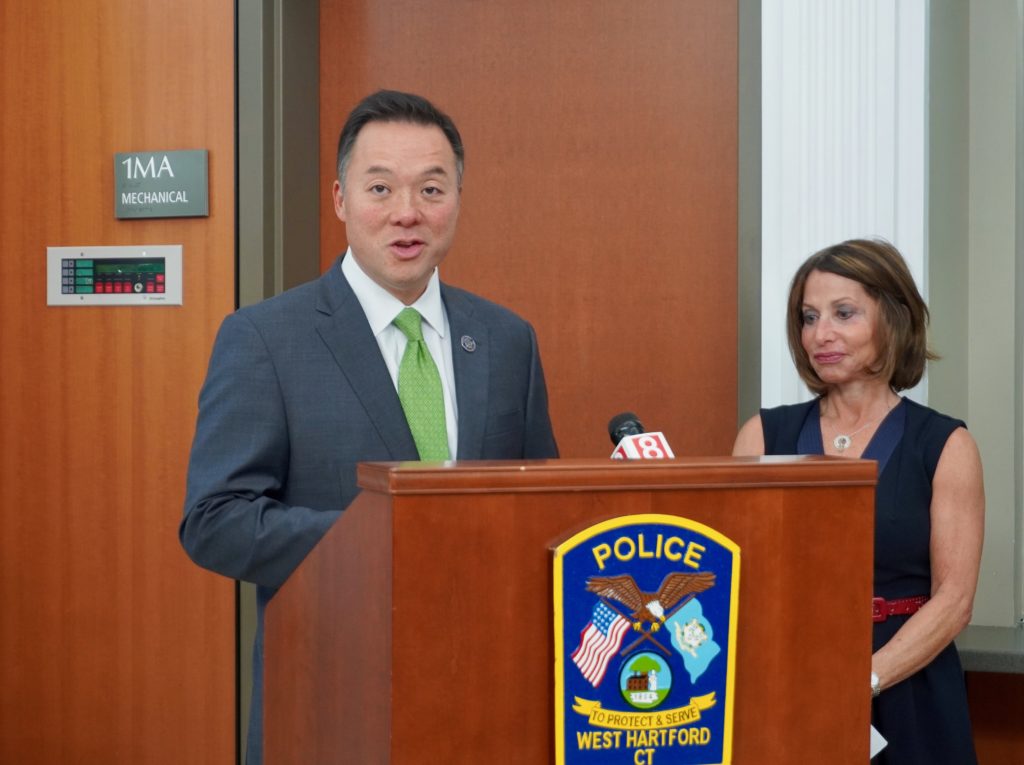
Attorney General William Tong. Photo credit: Ronni Newton
“All of us probably have prescription drugs in our medicine cabinets for too long,” he said, and that’s a major factor in the opioid addiction crisis. “I don’t think we have adequate controls on how much prescription medication was prescribed, and to whom, and that was a huge mistake that we made. … So many people, including many young people, received the now notorious bottle of way too much oxycontin.”
Tong, who has young children, said several years ago he personally was prescribed hydrocodone for pain related to gout, took a few, but then like so many others was left with the rest of the bottle in his cabinet. “I don’t have to tell you that these unwanted prescriptions, particularly the opioids or those that produce some narcotic effect can end up in the hands of teens who then may use them or sell them to their peers or people at school, and these pills end up being trafficked by drug dealers and criminals.”
Proper disposal helps keep the drugs out of that cycle, that black market, Tong said.
“We are still confronting the opioid addiction crisis. We will confront it as long as you and I are in public service it will be with us. We still lose people,” he said, including the more than 1,500 people who will lose their lives in Connecticut this year. “It’s the worst public health crisis in America.”
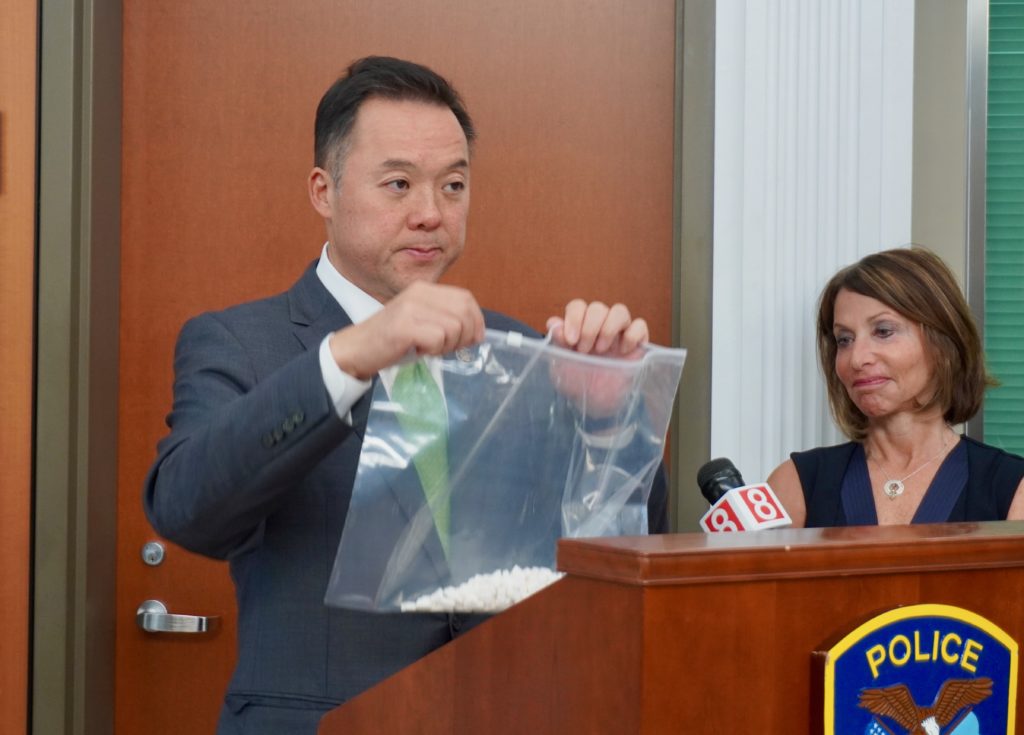
Attorney General William Tong places unwanted medication into a special plastic pouch before depositing it into the drop box at the West Hartford Police Station. Photo credit: Ronni Newton
Tong demonstrated how easy it is to use one of the collection boxes – first by dumping the unwanted pills into a special bag that is also provided, and then closing that bag and depositing it into the box. The bottle, if not eligible for recycling, should go into the trash.
David Lanzoni, the assistant special agent in charge of the New England Field Division, U.S. Drug Enforcement Administration, said nationwide the country loses an average of 300 people a day due to drug poisonings. Last year, 110,000 people in the U.S. died as a result of drug poisonings, he said.
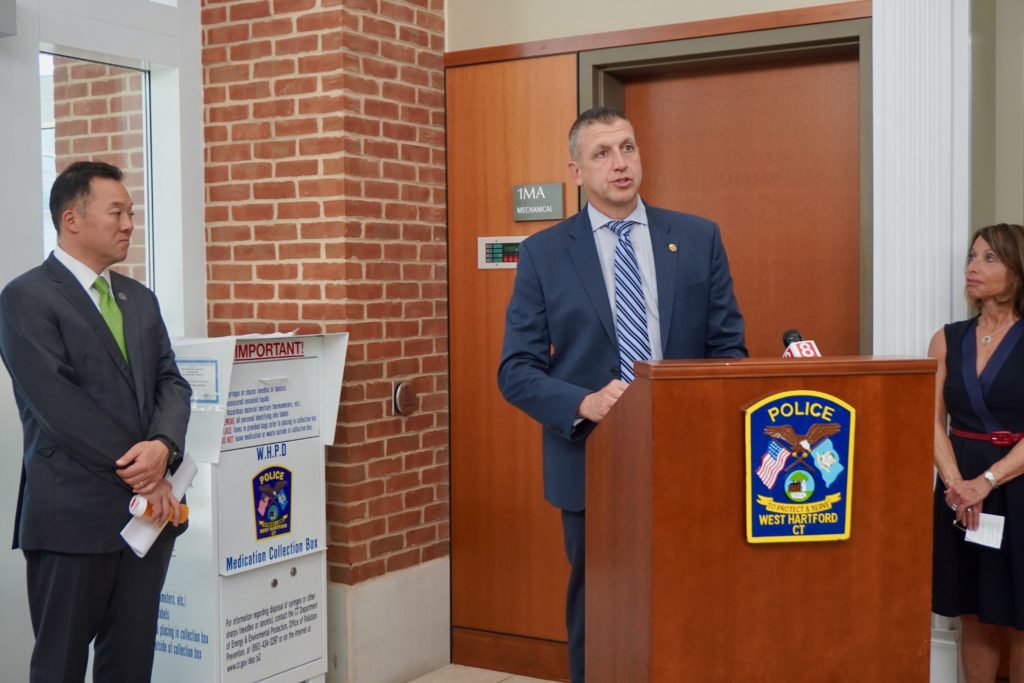
David Lanzoni, the assistant special agent in charge of the New England Field Division, U.S. Drug Enforcement Administration. Photo credit: Ronni Newton
“These are the sons, the daughters, brothers, sisters, friends, mothers, fathers, and families, and neighbors that are dying from a very, very bad plague across our country,” said Lanzoni. DEA’s Drug Take Back Day is a way to help combat medication misuse, he said.
“We all know it can start at home,” said Lanzoni. For more than a decade, National Take Back Day has had an impact, and he noted that most who misuse prescription medication initially get it from a family member in their own home.
“Working together with our law enforcement partners, Take Back Day has removed more than 8,000 tons of medication from people’s homes. That’s 8,000 tons that have not hit the street,” said Lanzoni.
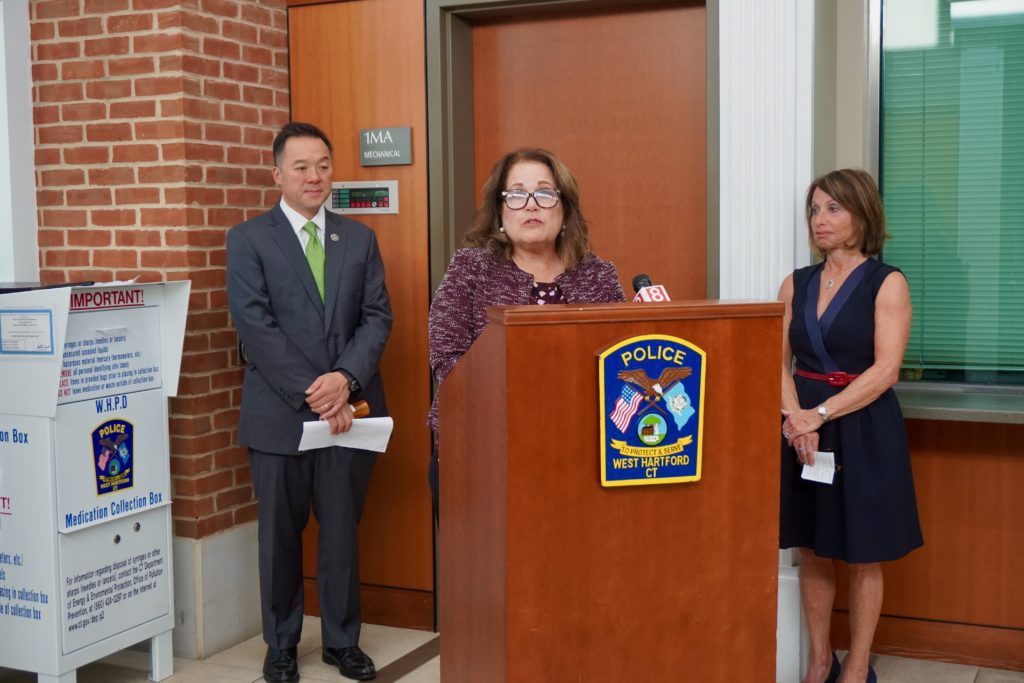
Department of Mental Health and Addiction Services Commissioner Nancy Navarretta. Photo credit: Ronni Newton
Department of Mental Health and Addiction Services Commissioner Nancy Navarretta said October is National Substance Use Prevention Month. “Substance use issues including underage drinking, alcohol dependency, misuse of prescription drugs, over-the-counter medications, illicit drug use, affect millions of Americans and hundreds of thousands of Connecticut residents in every community across the state,” she said.
National Take Back Day “has been an essential part of prevention strategy for the past decade,” Navarretta said, and helps people rid their homes of medication before it falls into the wrong hands. During the April Take Back Day alone, over 9,000 pounds of medications were collected across the state, she said. In the past 12 years, Connecticut has collected and properly disposed of 165,000 pounds of unwanted medication.
“People who misuse medications such as opioids may get access to their first dose from the medicine cabinets of their parents, relatives, or friends,” said Navarretta. DMHAS supports statewide prevention efforts including raising awareness of the dangers related to unsafe disposal and improper storage of medications, she said.
Navarretta noted that for anyone who can’t make it to Take Back Day or drop unwanted medication at a collection box, free medication disposal bags/pouches can be obtained through the website drugfreect.org.
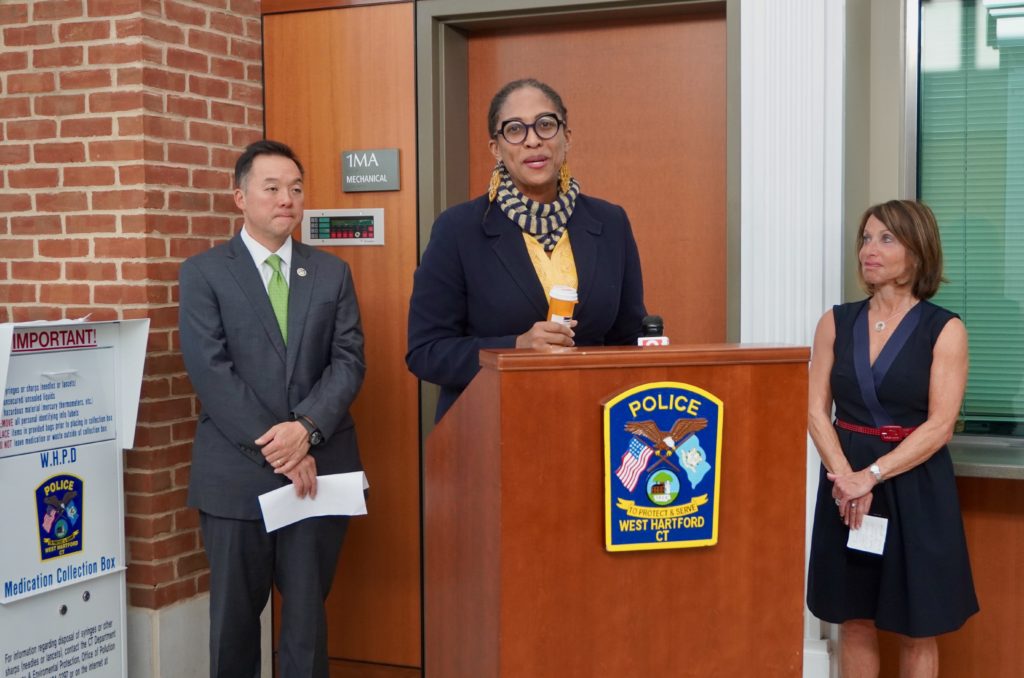
Department of Consumer Protection Deputy Commissioner Shirley Skyers-Thomas. Photo credit: Ronni Newton
Department of Consumer Protection Deputy Commissioner Shirley Skyers-Thomas said Drug Take Back Day is a “great time to check your home cabinets to see what’s expired, to see what’s unwanted, what’s unused, and also what you’re intending on keeping and making sure it’s secured properly.”
She said there are 116 DCP-approved boxes across Connecticut, but also said there are other safe ways to dispose of drugs, including removing or blaming out labels, diluting them with soapy water to make the medication unstable, and sealing and placing the original containers inside other containers that can then be thrown into the trash.
West Hartford Mayor Shari Cantor, who introduced Tong, urged residents to safely dispose of unwanted medication and said the town is fortunate to have a drop box at the police station. She also shared a statement about the devastating mass shooting Wednesday night in Lewiston, Maine – the location of Bates College, which draws many students from town.
“Lewiston, Maine, and all of Maine, are in our hearts and prayers right now,” Cantor said. “It’s a disease unique to this country,” she said of the epidemic of mass shootings, the most recent of which has led to at least 18 deaths and injury to more than a dozen others at a bowling alley and bar in Lewiston.
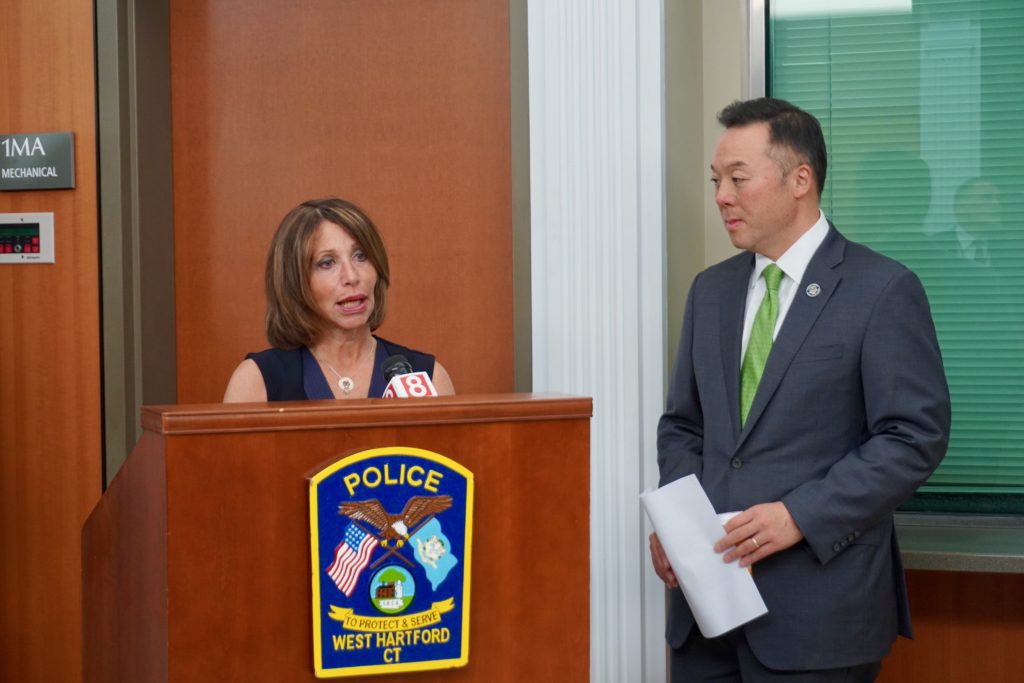
West Hartford Mayor Shari Cantor. At right is Attorney General William Tong. Photo credit: Ronni Newton
In West Hartford, the collection will take place on Saturday, Oct. 28, from 10 a.m. until noon, in the parking lot of Charter Oak International Academy. The collection is anonymous and free of charge, and prescription as well as over-the-counter dosage medications, (tablets, capsules, patches, vaping products, and liquids) will be accepted. Intra-venous solutions, injectable medicines, Epi-pens, and needles are not be accepted.
For more information, contact the Health District at (860) 561-7900 or the West Hartford Police Department at 860-570-8845.
More information about other collection sites throughout the state can be found at Take Back Day (dea.gov).
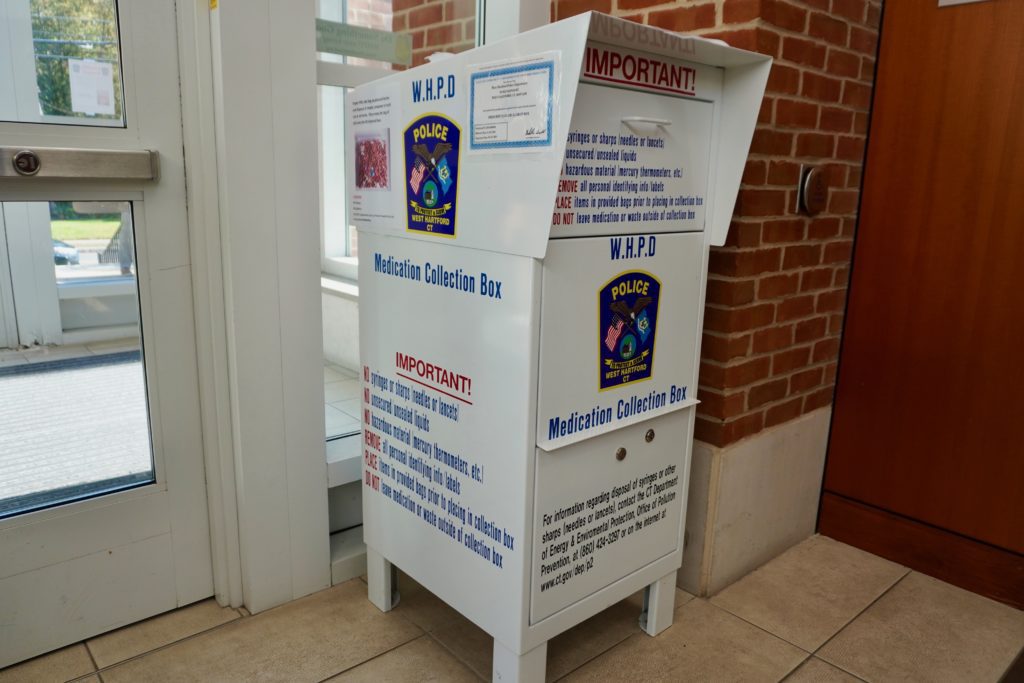
Medication Drop Box at the West Hartford Police Department. Photo credit: Ronni Newton
Like what you see here? Click here to subscribe to We-Ha’s newsletter so you’ll always be in the know about what’s happening in West Hartford! Click the blue button below to become a supporter of We-Ha.com and our efforts to continue producing quality journalism.


